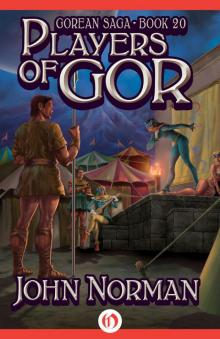- Home
- Norman, John;
Tribesmen of Gor Page 2
Tribesmen of Gor Read online
Page 2
“Why,” asked Samos, “should the slave ships cease their runs?”
“An invasion?” I asked.
“Unlikely,” said Samos. “If an invasion were to be launched soon, surely the slave runs would continue. Their cessation would surely alert the defense and surveillance facilities of Priest-Kings. One would not, surely, produce a state of apprehension and heightened awareness in the enemy prior to an attack.”
“It does not seem so,” I admitted, “unless the Kurii, perhaps, feel that just such a move might put the Priest-Kings off guard, that it would be too obvious to be taken as a prelude to full war.”
“But this possibility, doubtless,” smiled Samos, “too, is one which will not fail to be considered by the rulers of the Sardar.”
I shrugged. It had been long since I had been in the Sardar.
“It may mean an invasion is being readied,” said Samos. “But I think the Kurii, who are rational creatures, will not risk full war until reasonably assured as to its outcome. I suspect their reconnaissance is as yet incomplete. The organization of native Kurii, which would have constituted a splendid intelligence probe, and was doubtless intended primarily as such, yielded them little information.”
I smiled. The invasion of native Kurii from the north, survivors and descendants of ship Kurii, for generations, had been stopped in Torvaldsland.
“I think,” said Samos, “it is something other than an invasion.” He looked at me grimly. “It is, I suspect, something which would render an invasion unnecessary.”
“I do not understand,” I said.
“I have much fear,” said Samos. I regarded him. I had seldom seen him so. I looked at the heavy, squarish face, burned by the wind and salt of Thassa, the clear eyes, the white, short-cropped hair, the small golden rings in his ears. His face seemed drained of color. I knew he could stand against a hundred swords, unflinching.
“What is it,” I asked, “which would render an invasion unnecessary?”
“I have much fear,” said Samos.
“You said you had other information,” I said.
“Two things,” said Samos. “Follow me.” I continued to follow him through various corridors, and down stairways in his house. Soon the walls became damp, and I gathered we were beneath the levels of the canals. We passed barred doors, heavily guarded. Passwords, appropriate to different levels and portions of the house, were given and acknowledged. These are changed daily. For a portion of our way, we passed through certain sections of the pens. Some of the ornately barred, crimson-draped cells, with brass bowls, and rugs, and cushions and lamps, were quite comfortable; some of the cells held more than one occupant; some of the girls were permitted cosmetics and slave silk; generally, however, girls in the pen are raw, totally, save for their collars and brands, as are male slaves; the costumer, the perfumer, the hairdresser then does with them what he is instructed; most retention facilities in the pens, however, are not so comfortable; most are simply heavy cages; some are small cement kennels, barred at the opening; some are tiny slave cages, sometimes separate, sometimes bolted together, sometimes tiered; others, about a yard square and four or five yards long are walled with chain links, fastened about metal stanchions; I saw the eyes of some of the girls in these latter housings, stripped and kneeling, wide with fear, as we passed; some had their fingers crooked about the linkage; the general neglect, and the darkness and the dampness, and the loneliness, are doubtless hard to bear, but, too, one supposes, the passage of a free man is frightening, one who is not merely a warder, providing, say, the nutritious slops and gruel on which they are fed; one supposes they wish to escape their incarceration, but, too, especially if they are new slaves, they are doubtless apprehensive concerning the intentions of the masters who come for them, with respect to their disposition; if they are more familiar with the collar they are likely to have little doubt as to their probable disposition, usually some sales chain, some sales shelf, some market block, hopefully in a city or town in which there is much affluence; the apprehension of the more experienced girl is likely to be rather as to the nature of the master at whose feet she will find herself; she will attempt to display herself well, in order that she may, as the bids heighten, obtain a well-to-do master, and presumably an easier life; to be sure, some such masters, aware of a girl’s wiles, will see to it that she is so worked that she may soon regret that she was not purchased by a potter, a peasant, a herdsman, a keeper of kaiila; she is worked as a low-price girl but is expected to serve in the furs, under the discipline of the lash, as what she is, a high-price girl; once we walked over iron gratings, beneath which were cages; the slaves, male or female, who are housed in these pits are usually entered into them and extracted from them through what would be the ceiling of the pit; rope is used; on the other hand, barred cell doors, at the floor level, may be opened between the cages; this can allow, for example, male slaves to enter a cage occupied by females; normally, however, male and female slaves are kept separate; this permits the sexual needs of each to be better managed and more judiciously exploited by the masters; sometimes a female slave is thrown to male slaves, as a discipline for her, or as a dessert for them, something to go with the slops and gruel.
We passed through two processing rooms; off one corridor was a medical facility, with mats and chains; we passed exercise rooms, training rooms; we passed the branding chamber; I saw heated irons within; we passed, too, the dreaded room of slave discipline; there were, in this room, suspended rings, whips, a large, heavy stone table.
As we passed the cages, male slaves glared at us sullenly; slave girls usually shrank back. One girl thrust her hands through the bars. “I am ready to be sold to a man!” she wept. “Sell me! Sell me!” A guard struck his leather switch against the bars before her face, and she fled back within the enclosure.
“She is not yet hot enough for the block,” I said.
“No,” said Samos.
Had she knelt at the bars, knees thrust through, her body, her face, tear-stained, pressed against them, arms extended, letting her arms be switched for the mere chance of possibly touching the guard’s body, then, perhaps, she would have been hot enough. Girls are often sent trembling, burning with passion, to the block. Many times I have seen them, on their feet, shudder and tremble at the auctioneer’s slightest touch. Sometimes, unseen by the buyers, they are aroused at the foot of the block, but not satisfied. They are then sent naked to the block to be sold, in this state of cruel frustration. Their attempts to interest the buyers in their flesh are sometimes fantastic. Some of them almost scream in misery, aching for the physical and psychological completion of what has been done to their bodies. I have seen girls whom the auctioneer had to beat from him with his whip, merely in order to display them adequately. These girls, of course, are slaves who have been previously owned. Women who have not been previously owned, like free women, for the most part, even if naked and collared, do not yet understand their sexuality. That can only be taught to them by a man, they helpless, in his power. An unowned girl, a free woman, thus, can never experience her full sexuality. A corollary to this, of course, is that a man who has never had an owned woman in his arms does not understand the full power of his manhood. Sexual heat, it might be mentioned, is looked upon in free women with mixed feelings; it is commanded, however, in a slave girl. Passion, it is thought, deprives the free woman to some extent of her freedom and self-control; it is frowned upon because it makes her behave, to some extent, like a degraded female slave; free women, thus, to protect their honor and dignity, their freedom and personhood, their individuality, must fight passion; the slave girl, of course, is not entitled to this privilege; it is denied to her, both by her society and her master; while the free woman must remain cool and in control of herself, even in the arms of her companion, to avoid being truly "had,” so to speak, the slave girl is permitted no such luxury; no woman is so frequently, so profoundly, so uncompromisingly, so helplessly, so completely, so irresistibly "had" as she; her c
ontrol, you see, is in the hands of her master, and she must, upon the mere word of her master, surrender herself, writhing, to the humiliating heats of a degraded slave girl’s ecstasy. Only when a woman is owned can she be fully enjoyed.
A silken urt, with wet fur, brushed against my leg.
“Here,” said Samos, at the end of the corridor, one of the lowest in the pens. He uttered the password through the beamed, metal-sheathed door. It swung open. Beyond it was another corridor, but one much shorter. It was dark and damp. Samos took a torch from the guard, and went to one of the doors. He looked through the tiny slit in the door, holding the torch up. Then he slid back the bolt and, bending over, entered the room. There was a foul stench of excrement from within.
“What do you think?” asked Samos.
He held the torch up.
The chained shape did not move. Samos took a stick from beside the door, with which the jailer thrust the pan of water or food toward the shape.
The shape was apparently either asleep, or dead. I did not hear breathing.
An urt scurried suddenly, unexpectedly, toward a crack in the wall. It disappeared within.
Samos touched the shape with the stick. Suddenly it turned and bit the stick through, eyes blazing. It hurled itself, some eight hundred pounds of weight, to the length of the six chains that fastened it, each chain to a separate ring, to the wall. The chains jerked at the rings, again and again. It bit at us. Claws emerged and retracted, and emerged again, from the tentaclelike six-digited appendages of the thing. I looked at the flat, leathery snout, the black-pupiled, yellowish-corneaed eyes, the ears flat back against its head, the wide, fang-rimmed orifice of a mouth, large enough to bite the head from a man. I heard the rings groan in the stone. But they held. I removed my hand from the sword hilt.
The beast sat back against the wall, watching us. It now blinked, against the light of the torch.
“This is the first one, living, that I have seen,” said Samos.
Once before, in the ruins of a hall in Torvaldsland, surmounting a stake, he had seen the head of such a beast.
“It is a Kur, surely,” he said.
“Yes,” I said, “it is an adult Kur.”
“It is a large one, is it not?” asked Samos.
“Yes,” I said, “but I have seen many larger.”
“As nearly as we can determine,” said Samos, “it is only a beast, and not rational.”
I smiled.
It was chained in six places, at the wrists and ankles, and about the waist, and again about the throat. Any of the chains might have held a bosk or a larl.
It snarled, opening its fanged mouth.
“Where did you take it?” I asked.
“I bought it from hunters,” said Samos. “It was taken southeast of Ar, proceeding in a southeasternly direction.”
“That seems unlikely,” I said. Few Goreans would venture in that direction.
“It is true,” said Samos. “I know the chief of the hunting pride. His declaration was clear. Six men died in its capture.”
The beast sat, somnolent, regarding us.
“But why would it, a Kur, venture to such a place?” I asked.
“Perhaps it is insane?” suggested Samos.
“What purpose would such a journey serve for a Kur?” I asked.
Samos shrugged. “We have been unable to communicate with it,” he said to me. “Perhaps not all Kurii are rational,” he said. “Perhaps this one, as perhaps some of the others, is simply a dangerous beast, nothing more.”
I looked into the beast’s eyes. Its lips, slightly, drew back. I smiled.
“We have beaten it,” said Samos. “We have whipped it, and prodded it. We have denied it food.”
“Torture?” I asked.
“It did not respond to torture,” said Samos. “I think it is irrational.”
“What was your purpose?” I asked it. “What was your mission?”
The beast said nothing.
I rose to my feet. “Let us return to the hall,” I said.
“Very well,” said Samos. We left the chamber.
* * * *
The belled left ankle of the dancer moved in a small circle on the mosaiced floor, to the ringing of the bells, and the counterpoint of the finger cymbals.
Men lifted their cups to Samos as we re-entered the hall. We acknowledged their greetings.
Two warriors, guards, held, between them, a dark-skinned slave girl. She had long, black hair. Her arms were bound tightly to her sides, her wrists crossed and bound behind her. They thrust her forward. “A message girl,” said one of them.
Samos looked at me, quickly. Then to one of those at the table, one who wore the garments of the physicians, he said, “Obtain the message.”
“Kneel,” said Samos. The girl, between the guards, knelt.
Samos loomed over her. “Whose are you?” he asked.
“Yours, Master,” she said. It is common for the girl to be given to the recipient of the message.
“Whose were you?” asked Samos.
“I was purchased anonymously from the public pens of Tor,” she said.
Certain cities, like Tor, dealt in slaves, commonly buying unsold girls from caravans, and selling them at a profit to other caravan masters. The city’s warriors, too, were paid a bounty on women captured from enemy cities, customarily a silver tarsk for a comely female in good health.
“You do not know who purchased you, or why?” asked Samos.
“No, Master,” she said.
She would not know the message she bore.
“What is your name?” asked Samos.
“Veema,” she said, “if it pleases Master.”
“What was your number in the pens of Tor?” asked Samos.
“87432,” she said, “Master.”
The member of the caste of physicians, a laver held for him in the hands of another man, put his hands on the girl’s head. She closed her eyes.
“Then,” said I to Samos, “you do not know from whom this message comes.”
“No,” said he.
The physician lifted the girl’s long dark hair, touching the shaving knife to the back of her neck. Her head was inclined forward.
Samos turned away from the girl. He indicated to me a man who sat at a far end of one of the low tables. He did not drink wine or paga. The man, rare in Port Kar, wore the kaffiyeh and agal. The kaffiyeh is a squarish scarf, folded over into a triangle, and placed over the head, two points at the side of the shoulders, one in back to protect the back of the neck. It is bound to the head by several loops of cord, the agal. The cording indicates tribe and district.
We went to the man. “This is Ibn Saran, salt merchant of the river port of Kasra,” said Samos.
The red salt of Kasra, so called from its port of embarkation, was famed on Gor. It was brought from secret pits and mines, actually, deep in the interior, bound in heavy cylinders on the backs of pack kaiila. Each cylinder, roped to others, weighed in the neighborhood of ten stone, or some forty pounds, a Gorean "Weight.” A strong kaiila could carry sixteen such cylinders, but the normal load was ten. Even numbers are carried, of course, that the load is balanced. A poorly loaded kaiila can carry far less weight than one on whom the burden is intelligently distributed.
“Ibn Saran, in the past months, has heard an unusual thing,” said Samos. “I learned of this from a captain, one known to him, with whom he spoke recently upon the salt wharf.” Samos was first in the Council of Captains of Port Kar, which body was sovereign in the city. There was little of interest which did not, sooner or later, come to his attention.
“The noble Samos has been most kind,” said Ibn Saran. “His hospitality has been most generous.”
I extended my hand to Ibn Saran and he, bowing twice, brushed twice the palm of his hand against mine.
“I am pleased to make the acquaintance of he who is friend to Samos of Port Kar,” said Ibn Saran. “May your water bags be never empty. May you have always water.”<
br />
“May your water bags be never empty,” I said. “May you have always water.”
“If it pleases you, noble Ibn Saran,” said Samos, “would you speak before my friend what heard you in Kasra.”
“It is a story told by a boy, a tender of kaiila. His caravan was small. It was struck by storm, and a kaiila, maddened by wind and sand, broke its hobble, plunging away into the darkness. Foolishly the boy followed it. It bore water. In the morning the storm had passed. The boy dug a shelter trench. In the camp was organized the wheel.”

 The Emperor
The Emperor Kajira of Gor
Kajira of Gor Players of Gor
Players of Gor Renegades of Gor
Renegades of Gor Blood Brothers of Gor
Blood Brothers of Gor Plunder of Gor
Plunder of Gor Mercenaries of Gor
Mercenaries of Gor Raiders of Gor
Raiders of Gor Gor 30 - Mariners of Gor
Gor 30 - Mariners of Gor Tribesmen of Gor
Tribesmen of Gor Magicians of Gor
Magicians of Gor Mariners of Gor
Mariners of Gor Assassin of Gor
Assassin of Gor Vagabonds of Gor
Vagabonds of Gor